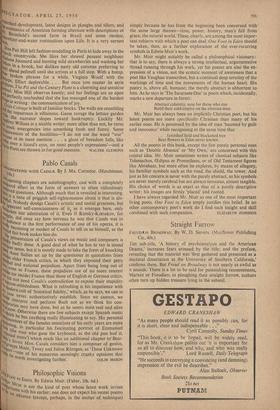. "NE F.... , Philosophic Visions 1,,,,,.- ,, i IN EDEN. By Edwin
Muir. (Faber, 10s. 6d.)
[
co4101: .N1 um is not the kind of poet whose latest work invites 10 be risons with his earlier; one does not expect his recent poems ail advance (except, perhaps, in the matter of technique) simply because he has from the beginning been concerned with the same large themes—time, power, history, man's fall from grace, the natural world. These, clearly, are among the most impor- tant subjects with which a poet can deal. One Foot in Eden should be taken, then, as a further exploration of the ever-recurring symbols in Edwin Muir's work.
Mr. Muir might suitably be called a philosophical visionary : that is to say, there is always a strong intellectual, argumentative thread running through his work, yet his poems are alsd the ex- pression of a vision, not the ecstatic moment of awareness that a poet like Vaughan transcribes, but a continual deep scrutiny of the workings of time and the movements of the human heait. His poetry is, above all, humane; the merely abstract is abhorrent to him. As he says in 'The Incarnate One' (a poem which, incidentally, marks a new departure in form): Abstract calamity, save for those who can Build their cold empire on the abstract man.
Mr. Muir has always been an implicitly Christian poet, but his latest poems are more specifically Christian than many of his earlier ones. He is possessed by the idea of man 'haunted by guilt and innocence' while recognising at the same time that . . famished field and blackened tree
Bear flowers in Edcn never known.
All the poems in this book, except the few purely personal ones such as 'Double Absence' or 'My Own,' are concerned with this central idea. Mr. Muir sometimes writes of classical subjects like Telemachos, CEdipus or Prometheus, or of Old Testament figures like Abraham, but more often he explores, by means of allegory, his familiar symbols such as the road, the shield, the tower. And just as his concern is never with the purely abstract, so his symbols are never merely cerebral but are always sensuous, almost tangible. His choice of words is as exact as that of a purely descriptive writer; his images are firmly `placed' and rooted.
I have always regarded Mr. Muir as one of the most important living poets. One Foot in Eden amply justifies this belief. In no other contemporary poet's work do 1 find such insight and skill combined with such compassion. ELIZABETH JENNINGS










































 Previous page
Previous page